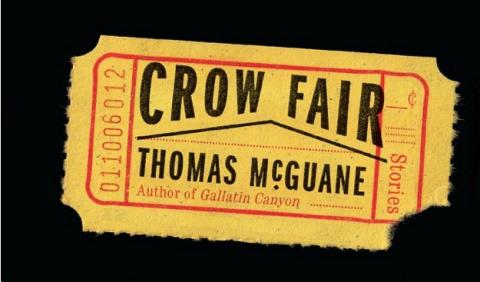Comedy, Tragedy Collide in Thomas McGuane’s ‘Crow Fair’

Crow Fair
By Thomas McGuane
Knopf
267 pgs.
By any standard worth measuring, Thomas McGuane’s third novel 92 in the Shade (1973) is a defining work of its era. From the opening lines (“Nobody knows, from sea to shining sea, why we’re having all this trouble with our republic …”), the novel charts the life-and-death fortunes of one Tom Skelton, a living, breathing stand-in for the nation at large in the 1970s—both in the grip of its ecstatic misadventures and its all-encompassing sense of dread.
Early on, Skelton journeys home to Florida while in the throes of a bad acid trip, fearing he can’t hitch a ride because drivers will think he’s insane:
“No one said he was insane; neither the hardware salesman, the United Parcel driver nor the crawfisherman who drove the last leg into Key West suggested such a thing. When Skelton told the hardware salesman that the paint had just lifted off the whole car in a single piece, the hardware salesman agreed with him about how Detroit put things together. This was the epoch of uneasy alliances.”
Along with Dog Soldiers by Robert Stone (another pivotal novel with which it shares a deep affinity), 92 in the Shade announced the end of the exhausted ‘60s, if anything ever did.
Flash forward some 40-odd years, and McGuane’s writing has grown leaner and more mature, while maintaining a characteristically deft balance between over-the-top comedy and heartbreaking tragedy. In Crow Fair, a new collection of short stories set mostly in Montana’s Big Sky country, he depicts better than most what one character thinks of as “the blizzard of things that could never be explained and that pointlessly exhausted all human inquiry.”

Take, for example, “Shaman,” in which a series of misunderstandings leads to a local sheriff (accompanied by his deputy Eric Caldwell) shooting a man named Rudy. A dire outcome, to be sure, yet the story is replete with the author’s seemingly bottomless supply of one-liners:
“It had been obvious that Rudy was completely harmless. The doctors at the Warm Springs hospital made such a huge point of it that the whole town was embarrassed. Dan Sheare at the Ford dealership said it was like they had shot the Easter Bunny, ‘Town Without Pity,’ and so forth … Eric, however, who had been born right there in the town, moved away. Eventually people quit asking where Eric had got off to, just assuming he had landed on his feet somewhere. Probably his sister still heard from him. She lived over where the first post office burned down giving her a great view of the mountains.”
Another story, “River Camp,” is a wonderfully complex and haunting tale about Tony and Jack, two old friends on an ill-fated fishing trip. The narrative, layered with snippets from the friends’ troubled past, declares near the outset things will end badly. This only propels the reader on, like the witness to a multi-car pile-up who’s unable to look away.
The male narrator of “On a Dirt Road,” like others in this collection, is acutely aware of his personal shortcomings, but falls short in efforts to improve himself:
“I have a way of extolling peace and quiet in theory without enjoying it in practice and end up fending off the idea that I’ve been abandoned. As I’ve grown older, I’ve begun listing my more regrettable traits, and this one has always made the cut. I think the list was supposed to help me improve myself, but it’s turned out to be just another list alongside yard chores, oil changes, and storm windows.”
The opening stories in Crow Fair have their place in the McGuane canon, but in the later pages (in stories like “Stars,” “Motherlode,” and “Canyon Ferry”), he reaches for—and often achieves—a profundity elusive to many other writers of his generation. It’s impossible to finish reading these stories and not come away awed by his vision and talent.
Recently, on NPR, McGuane looked back on 92 in the Shade and his other early work, compared to where he is now: “I think when I first started out I had a kind of an exuberance about language, comedy, narrative leaps that ... stopped just short of non sequiturs. And I'm much more cautious now. I look things over a little bit more carefully before leaping into them. ... I like writing that's a bit more direct because I hope the subjects are difficult enough that they supply all the indirection that I could possibly manage.”
More direct, less flowery, Crow Fair is further demonstration of Thomas McGuane’s abundant storytelling powers.
Author Bio:
Lee Polevoi, author of The Moon in Deep Winter and Highbrow Magazine’s chief book critic, is completing a new novel.






























































































































































































































































































































